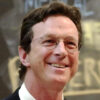
Michael Crichton
After graduating from the Harvard Medical School, Michael Crichton embarked on a career as a writer and filmmaker. Called "the father of the techno-thriller," his novels include The Andromeda Strain, Congo, Jurassic Park, Timeline, and his latest, Prey. He has also written four books of non-fiction, including Five Patients, Travels, and Jasper Johns.
He has sold over 100 million books and his books have been translated into thirty languages and twelve have been made into films. He is also the creator of the television series ER. He is the only person to have had, at the same time, the number one book, the number one movie, and the number one TV show in the United States.
Always interested in computers, Crichton ran a software company, FilmTrack, which developed computer programs for motion picture production in the 1980s; for this pioneering work he won an Academy of Motion Pictures Arts and Sciences Technical Achievement Award in 1995. His film Westworld was the first feature film to employ computer-generated special effects.
Crichton has won an Emmy, a Peabody, and a Writer's Guild of America award for ER. In 2003, a newly-discovered armored dinosaur was named for him: Crichtonsaurus Bohlini. Crichton was named one of the "Fifty Most Beautiful People" by People magazine in 1992, but, he observes, never again. Michael Crichton sadly passed away in 2008 after being diagnosed with lymphoma.


 August 29, 2005
August 29, 2005